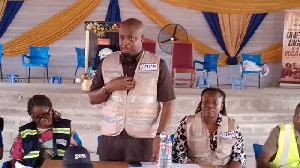Business News of Wednesday, 2 April 2025
Source: www.ghanawebbers.com
Education Minister establishes committee to abolish FSHS double-track system

The double-track system was introduced due to infrastructure deficits. This system has reduced contact hours and instructional time. As a result, education standards have been negatively impacted.
“One major issue with FSHS is quality,” said a committee member. “Students spend more time at home than in school, affecting performance.” He emphasized the importance of the committee's work. Resources will be provided to address these issues.
To tackle infrastructure gaps at the SHS level, the government will prioritize completing abandoned E-Blocks and other GETFund projects. Currently, 62 GETFund projects in senior high schools are abandoned. The ministry plans to mobilize resources for 22 of them urgently using its capital expenditures budget.
The minister highlighted that this move fulfills a key campaign promise by President John Dramani Mahama. He pledged to address challenges within the FSHS program and eliminate the double-track system when elected. The FSHS was started when infrastructure was inadequate, leading to the double-track situation.
Many E-Block classroom projects began under the NDC administration in 2015 but were later abandoned. These projects will now be completed to provide more infrastructure for students. “The essence of the FSHS review is to improve quality,” he stated.
Mr. Haruna Iddrisu mentioned converting some E-Block Day schools into boarding schools for convenience. These schools will be equipped with necessary infrastructure. The committee will also explore incorporating private senior high schools into the FSHS program while assessing cost implications.
Additionally, Ghana aims to synchronize its academic calendar with WASSCE by 2027. This ensures students can sit for exams alongside their regional counterparts. “Ghana cannot afford a different timetable,” Iddrisu added.
By 2027, there should be a fully functional FSHS system with adequate facilities supported by modern technology. The 11-member committee is chaired by Prof. Peter Grant from UCC and includes representatives from various institutions.
Other members include Prof. Godwin Awabil (UCC), Prof. Samuel A. Atintono (PRINCOF), and Dr. Munawaru Issahaque (GES). The chairman assured the minister of their commitment to delivering on their mandate efficiently.
Also present were Clement Apaak (Deputy Minister for Education) and Prof. Ernest Kofi Davis (Director-General of GES). Prof. Davis emphasized that these reforms aim to strengthen the FSHS policy for equitable access and improved quality in secondary education.










